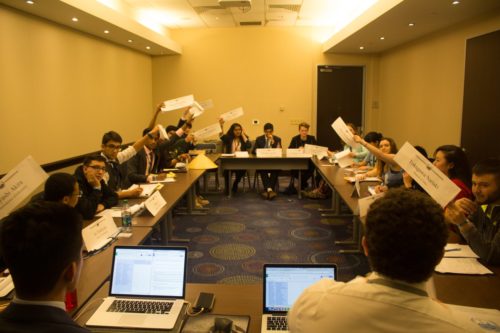To the uninformed, crisis committees can seem to operate without rhyme or reason. Unlike the structured and formal solution that resolves a General Assembly (GA) committee, crisis can conclude with coups, assassinations, and even outlandish alien takeovers.
What is crisis? Crisis committees are fast-paced MUN committees that often emulate small organizations and boards. Rather than representing a country, delegates take on the role of a character that can range from an ambassador to a news reporter to a fictional character, depending on the committee. Each delegate aims to assert their character’s viewpoint and end the conference having amassed the most social, political, or economic power, indicated by how much of their “out-of-room” comes “in-room”. Crisis is comprised of two main forums:
- In-room. This term refers to a delegate’s performance inside committee, including her speeches, collaboration with other delegates, and directive writing. In-room operates much like a GA committee. A chair calls for motions, and delegates cycle through moderated caucuses and unmoderated caucuses to debate possible solutions to the topics posed by the committee.
- Out-room. Out-of-room tactics are what make crisis unique from GAs. Through writing crisis notes that are delivered to crisis staffers, delegates can create their own storylines as they establish connections with figures in the realm of their committee and take advantage of loopholes other delegates have created in their in-room directives to gain greater power.

In crisis committees, delegates write two primary types of documents:
- Directives. Much like the working papers and draft resolutions that emerge from GA committees, directives are composed of sponsors, signatories, and clauses.
- Sponsors are those that have directly contributed to writing the document.
- Signatories are individuals who are interested in seeing the document presented for voting, but do not necessarily support the entirety of the document and did not contribute to writing it.
- Directives are written in-room and consist of operative clauses, or statements starting with an action verb, that describe a solution to the issue. Unlike GA writing, crisis writing does not require preambulatory clauses that describe the background of the problem.
- Crisis notes. These multifaceted notes drive the flow of committee. Each delegate creates their own story-line, or crisis arc, as they accumulate as many resources as possible. Delegates address crisis notes to another character that is not represented by another person in the committee room that can offer them a path to acquire resources. For example, at my first crisis committee, I wrote to Sharon Choi, Parasite director Bong Joon-ho’s translator, knowing that I could employ her media contacts.
Part of what makes crisis committees so quick is the simultaneous nature of directive-writing and giving speeches. While moderated caucuses are ensuing, delegates also write solutions to the issue being discussed and will circulate their directives around the table to collect signatories as individuals are speaking. Delegates may also have to speak on solutions they are currently writing or have not yet started writing should they be called on before completing their directive.
As you craft your storyline, keeping in mind a checkpoint for each night of the conference is critical.
A. The aim of the first day of committee session is to establish a foundation for the chaos you want to create later in the conference. Your first notes should collect resources: physical armies, an outlet to spread your propaganda, or needed connections for funding or later events.
B. Over the next few committee sessions, your crisis should move towards a small peak— something intriguing enough that the crisis staff will bring it in-room, but not so dramatic that your storyline reaches its climax.
C. The day before the conference ends, crisis notes should build and execute the climax of your storyline, the most impactful element of your arc that is so compelling that it demands a response from other delegates. At my first crisis conference, I made this a blackout in the city of Seoul that forced everyone to work in-room with the lights off until power could be restored to the city. Your last notes should culminate the resources and events you have caused over the weekend to attain your end goal.
Over the weekend, delegates might choose to collaborate on a JPD, or a joint-person directive.These notes draw from the resources of two or more delegates to increase the likelihood of executing a difficult event. When writing these notes, however, proceed with caution: delegates will write additional crisis notes to take advantage of loopholes in the JPD and accumulate more power than their co-authors.
If a delegate’s story-line is original and established enough, the crisis staff will choose to bring elements of it in-room to share as crisis updates with the rest of the committee. Without revealing the crisis arc that caused the situation, delegates will have to respond impromptu to problems generated in the out-room.
For new and first-time crisis delegates, crisis committees can be intimidating. But, knowing a few of these basic guidelines will streamline your first crisis experience.



